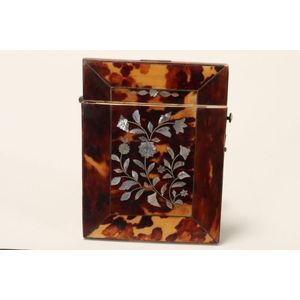Floral Decorated Card Case with Tortoise Shell and Mother-of-Pearl
19th century tortoise shell and Mother of pearl card case, of rectangular form, decorated with a central spray of flowers to each side, a/f, height 10 cm
You must be a subscriber, and be logged in to view price and dealer details.
Subscribe Now to view actual auction price for this item
When you subscribe, you have the option of setting the currency in which to display prices to $Au, $US, $NZ or Stg.
This item has been sold, and the description, image and price are for reference purposes only.
- Mother-Of-Pearl - Mother-of-pearl, technical name "nacre", is the inner layer of a sea shell. The iridescent colours and strength of this material were widely used in the nineteenth century as an inlay in jewellery, furniture, (especially papier mache furniture) and musical instruments.
In the early 1900s it was used to make pearl buttons. Mother-of-pearl is a soft material that is easily cut or engraved.
Nowadays it is a by-product of the oyster, freshwater pearl mussel and abalone industries. - A/f, as Inspected - The letters "A/F" or "as inspected" as part of a description is the cataloguer's shorthand for "all faults" or "as found", meaning the item has some type of damage or deficiency, it is of uncertain date or provenance, and/or that the seller takes no responsibility for the completeness of the item or the accuracy of the description.
- Tortoiseshell - Tortoiseshell is a translucent material that comes from the horny carapace of a certain types of turtles, including the hawksbill turtle. It is often therefore mounted on a colour underground - often red - or inlaid with gold or silver thread, as seen in Boulle furniture.
The texture and colour nuances of the material are extremely important. Heated tortoiseshell can easily be formed into various shapes. Like other natural materials, tortoiseshell becomes more beautiful with use. In a time before plastic, tortoiseshell was widely used for small objects such as combs and powder compacts.
In 1973, the trade of tortoiseshell worldwide was banned under CITES (The Convention on International Trade in Endangered Species). Prior to importing or exporting items containing tortoiseshell a CITES permit must be obtained. Tortoiseshell items cannot be traded on Ebay.
"Faux tortoiseshell", another case of man initiating nature, is made from old-style plastics such as celluloid and cellulos and is coloured with red, yellow and brown spots to imitate the genuine article. It is commonly used in glasses frames, musical instruments and costume jewellery.
This item has been included into following indexes:
-
card cases, English and French
- mother of pearl 100
- tortoiseshell 66
